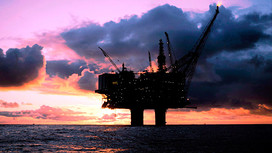 Ken Silverstein's 'The Secret World of Oil' explores a murky business on which the west depends. Oil is the world's most important traded commodity. It powers our cars and drives our industry. And surging energy demand in developing countries from China to Brazil means its significance will only grow.
Ken Silverstein's 'The Secret World of Oil' explores a murky business on which the west depends. Oil is the world's most important traded commodity. It powers our cars and drives our industry. And surging energy demand in developing countries from China to Brazil means its significance will only grow.
But how much do we really know about the business? Some of its public faces are familiar – the Gulf potentates, the bosses of BP and ExxonMobil, energy ministers in Europe and the US
There is also a dark side – an army of fixers, traders, intermediaries and lobbyists who grease the wheels, keep the industry humming and form big oil's connective tissue.
Such people normally inhabit the shadows. But Ken Silverstein, an investigative journalist and former Washington editor of Harper's Magazine, has put them centre stage in his new book, The Secret World of Oil. The result is an engaging journey through the sector's murkiest crevices, shot through with ill-concealed disgust at the corruption at its heart.
Silverstein presents some telling facts. There have been more violations of the US Foreign Corrupt Practices Act by energy companies than by any other kind of business, including weapons trading. Yet western countries, so reliant on crude exports from countries with oft-criticised regimes, often seem to lack the will to tackle the problem.
Take the example of General Teodoro Obiang Nguema Mbasogo of Equatorial Guinea. Under his rule, the tiny country has grown to become sub-Saharan Africa's third-largest energy producer. Yet it is also one of the world's worst kleptocracies, with staggering amounts of oil export revenue siphoned off into private bank accounts by the regime.
Mr Obiang's son, Teodoro Nguema Obiang Mangue – Teodorín to his friends – epitomises the excess. The US justice department alleges he used shell companies to funnel more than $100m into America, and then spent it on a $30m Malibu estate, aircraft, sports cars and Michael Jackson memorabilia, including a crystal-encrusted glove worn on the singer's late 1980s Bad tour.
Silverstein is scornful of Washington for failing to investigate oil company ties to the Obiang clan. He says the US government has opened an FCPA probe into five big oil groups doing business with Equatorial Guinea but has never brought charges against any of them.
"The US has shown it can take action when it wants to shut down terrorist financing or starve regimes, such as Iran, of investment and trade," he writes. "But it has done little to stop sitting dictators – especially oil-rich dictators – and their families from using America to stash their assets."
Teodorín is just one of the attractions in Silverstein's rogues' gallery. Others are: Tony Blair, excoriated for his role in advising Nursultan Nazarbayev, the authoritarian ruler of oil-rich Kazakhstan; Marc Rich, the oil trader who sold crude to apartheid South Africa and bought oil from Iran during the hostage crisis; Don Briggs, a lobbyist who has helped the oil industry consolidate "inordinate" power in the southern US state of Louisiana; and Bretton Sciaroni, a US lawyer who acts as gatekeeper for Hun Sen, the Cambodian strongman.
But there is an irony embedded in The Secret World of Oil: the world of oil is becoming a lot less secret than it used to be. For a start, the role of fixers has been diminishing since 1977, when the FCPA outlawed bribery abroad. That, combined with greater public scrutiny of big oil and more careful government monitoring of bank transfers, has made it much harder for energy companies to pay off foreign officials.
Oil trading, too has been transformed since the days of Rich, becoming a lot more transparent and rule-based.
Silverstein insists the corruption remains; it has just morphed into more refined forms. Lobbying in places such as the US may now be subject to disclosure laws but dictators have found new ways to win friends in the west, contributing to think-tanks, universities and non-government organisations and handing out huge consulting contracts to retired western politicians.
New kinds of pay-off are emerging that are technically legal. Western oil majors working in some African countries are frequently forced to form partnerships with local companies owned by presidents or oil minister.
Sometimes the structure of the book seems a little baggy. It is hard to see, for example, why there is a chapter on Cambodia, a country that is not really on the energy map. But that does not distract from its strengths. Silverstein has shone a bright light on some of the industry's darkest secrets and revealed the moral dangers inherent in our addiction to oil.
The writer is the FT's energy editor
FT




